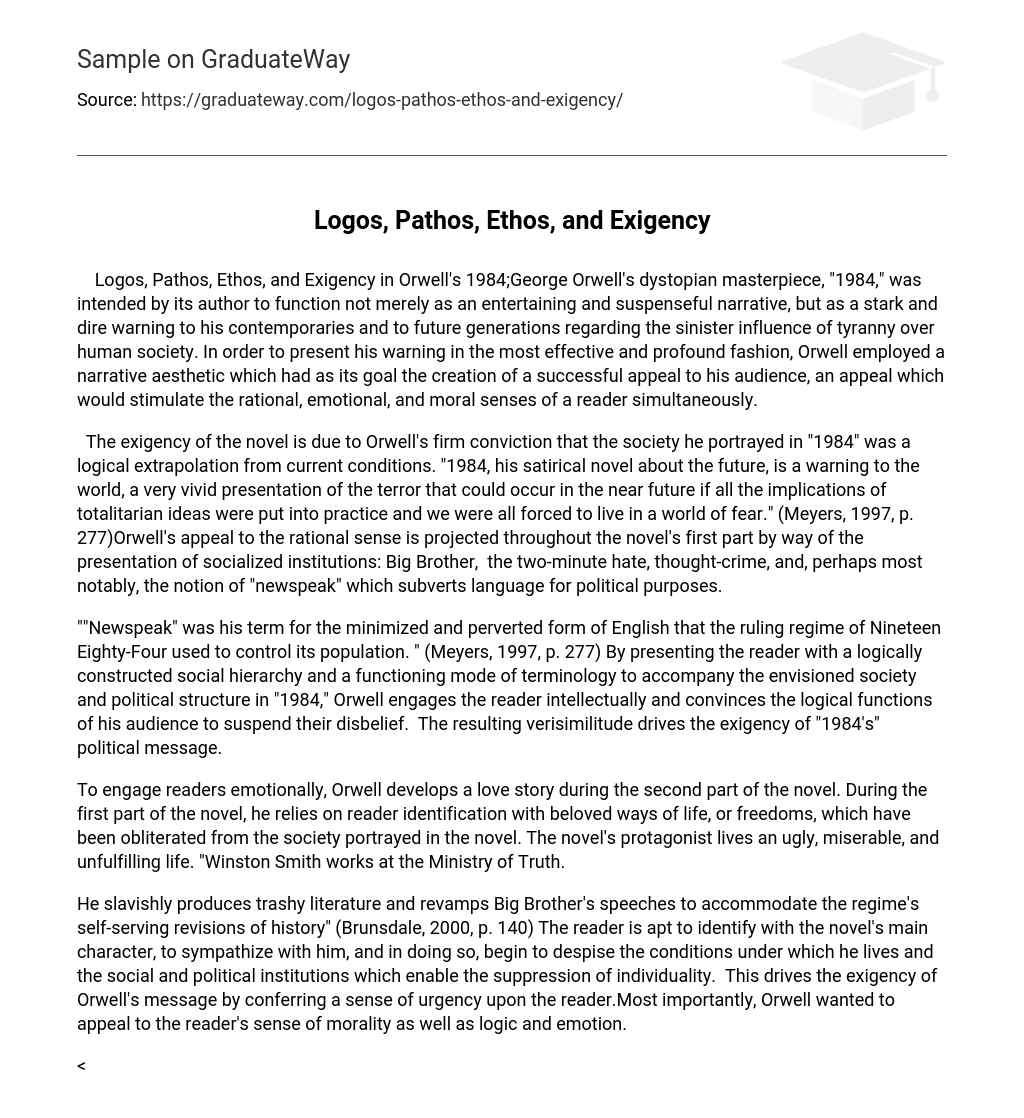Logos, Pathos, Ethos, and Exigency in Orwell’s 1984;George Orwell’s dystopian masterpiece, “1984,” was intended by its author to function not merely as an entertaining and suspenseful narrative, but as a stark and dire warning to his contemporaries and to future generations regarding the sinister influence of tyranny over human society. In order to present his warning in the most effective and profound fashion, Orwell employed a narrative aesthetic which had as its goal the creation of a successful appeal to his audience, an appeal which would stimulate the rational, emotional, and moral senses of a reader simultaneously.
The exigency of the novel is due to Orwell’s firm conviction that the society he portrayed in “1984” was a logical extrapolation from current conditions. “1984, his satirical novel about the future, is a warning to the world, a very vivid presentation of the terror that could occur in the near future if all the implications of totalitarian ideas were put into practice and we were all forced to live in a world of fear.” (Meyers, 1997, p. 277)Orwell’s appeal to the rational sense is projected throughout the novel’s first part by way of the presentation of socialized institutions: Big Brother, the two-minute hate, thought-crime, and, perhaps most notably, the notion of “newspeak” which subverts language for political purposes.
“”Newspeak” was his term for the minimized and perverted form of English that the ruling regime of Nineteen Eighty-Four used to control its population. ” (Meyers, 1997, p. 277) By presenting the reader with a logically constructed social hierarchy and a functioning mode of terminology to accompany the envisioned society and political structure in “1984,” Orwell engages the reader intellectually and convinces the logical functions of his audience to suspend their disbelief. The resulting verisimilitude drives the exigency of “1984’s” political message.
To engage readers emotionally, Orwell develops a love story during the second part of the novel. During the first part of the novel, he relies on reader identification with beloved ways of life, or freedoms, which have been obliterated from the society portrayed in the novel. The novel’s protagonist lives an ugly, miserable, and unfulfilling life. “Winston Smith works at the Ministry of Truth.
He slavishly produces trashy literature and revamps Big Brother’s speeches to accommodate the regime’s self-serving revisions of history” (Brunsdale, 2000, p. 140) The reader is apt to identify with the novel’s main character, to sympathize with him, and in doing so, begin to despise the conditions under which he lives and the social and political institutions which enable the suppression of individuality. This drives the exigency of Orwell’s message by conferring a sense of urgency upon the reader.Most importantly, Orwell wanted to appeal to the reader’s sense of morality as well as logic and emotion.
By inverting common “sins” or typical social diversions into instruments of political domination and exploitation, Orwell impresses his audience with the unethical basis of Big Brother. “The ugly misery of life in 1984 is perhaps the strongest impression that remains with the reader. Despite constantly victorious ‘production battles’ and successfully completed five-year plans, there are never enough goods to buy. Everything is state owned, everything is ersatz and ‘victory’; victory coffee, victory gin, even the apartment block in which the hero of the story lives is called Victory Mansions.
” (Meyers, 1997, p. 279)Orwell’s appeal to the reader in the first part of “1984” is to strike at different levels of psychological, emotional and intellectual perception to help the reader begin to “see.” In other words, the first part of “1984” utilizes a complex narrative aesthetic which engages the reader at the intellectual, emotional and moral levels simultaneously, so as to draw them into the projected dystopian world and enable them to live within it, to experience first-hand the ultimate horrors he, himself, could see as burgeoning possibilities for the political and social realities of Europe. By appealing to his audience with a “holistic” narrative, Orwell hoped to initiate them into the same awareness he had achieved for himself regarding the ever-present danger of tyranny and the suppression of individual liberty.
ReferencesBrunsdale, M. M. (2000). Student Companion to George Orwell.
Westport, CT: Greenwood Press.Meyers, J. (1997). George Orwell: The Critical Heritage.
London: Routledge.





